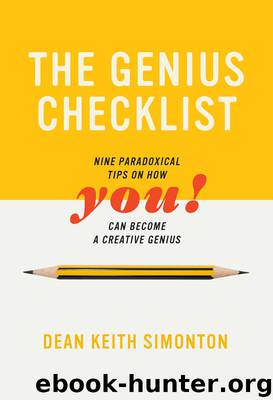The Genius Checklist: Nine Paradoxical Tips on How You Can Become a Creative Genius by Dean Keith Simonton

Author:Dean Keith Simonton
Language: eng
Format: epub
Tags: genius; creativity; achieved eminence; intelligence; arts versus sciences; scientific revolutionaries; IQ scores; personality; openness to experience; introversion versus extraversion; psychopathology; mad genius controversy; development; nature versus nurture; gender; family; education; birth order; talent; deliberate practice; 10-year rule; prodigies; polymaths; precursors; career landmarks; perfectionists versus mass-producers; one-hit wonders; late bloomers; life span; tragic death; multiple discovery and invention; genius versus zeitgeist; creative networks; cultural configurations, Cognitive Science, science, Psychology, General
Publisher: MIT Press
Published: 2018-10-02T00:00:00+00:00
Tip 7
Turn Yourself into a Child Prodigy / Wait Until You Can Become a Late Bloomer!
All pediatricians, and probably all conscientious parents, are familiar with the developmental norms applicable to any human embryo and infant. When during pregnancy does the embryo’s heart first start to beat, when do the brain and spinal cord emerge, and when do the other organs initiate their growth? After birth, in what order and at what ages do babies acquire the ability to control their lips, tongues, eye movements, and various external parts of their body, from head to toe? Finally, and perhaps most critical for many moms and dads, when will a baby start to sit up, stand, walk, and even run? When I taught child development in my introductory psychology course, I always showed the class a chart exhibiting the expected order and age in which these benchmarks occurred. Similar charts can be found in any parenting guide as well. But do you even know who first established these developmental norms? A Yale professor named Dr. Arnold Gesell. Unless you’re a child psychologist, you may not have heard of him, yet his name shows up very often in biographical dictionaries and encyclopedias devoted to the history of psychology. And deservedly so! Gesell is a prime example of someone who has flown below the radar of popular recognition. And yet, although remembered best among the historians of his discipline, he has certainly left a lasting mark in the landscape of history.
This little snippet of my discipline’s history is designed to highlight a key transition point in the Genius Checklist. The previous half-dozen tips all concentrated on how prospective geniuses might differ with respect to achievement, IQ, mental illness, genetic endowment, education, birth order, interests, and risk-taking, among other things. But now the preoccupation switches from who to when. At what chronological age do things begin to happen and at what age do they stop? Does it matter how the end comes? Those are the subjects of both Tip 7 and Tip 8, which explicitly deal with how creative genius emerges and manifests itself across the lifespan. That trajectory can also be tracked in terms of important career landmarks.
So let us begin with the first such landmark—when creative genius really takes off.
Download
This site does not store any files on its server. We only index and link to content provided by other sites. Please contact the content providers to delete copyright contents if any and email us, we'll remove relevant links or contents immediately.
The Art of Thinking Clearly by Rolf Dobelli(10489)
Mindhunter: Inside the FBI's Elite Serial Crime Unit by John E. Douglas & Mark Olshaker(9342)
Change Your Questions, Change Your Life by Marilee Adams(7780)
Nudge - Improving Decisions about Health, Wealth, and Happiness by Thaler Sunstein(7706)
Mastermind: How to Think Like Sherlock Holmes by Maria Konnikova(7347)
The Power of Now: A Guide to Spiritual Enlightenment by Eckhart Tolle(5781)
Men In Love by Nancy Friday(5240)
Altered Sensations by David Pantalony(5104)
Factfulness: Ten Reasons We're Wrong About the World – and Why Things Are Better Than You Think by Hans Rosling(4742)
The Confidence Code by Katty Kay(4260)
Thinking in Bets by Annie Duke(4227)
Man and His Symbols by Carl Gustav Jung(4135)
The Worm at the Core by Sheldon Solomon(3487)
Why Buddhism is True by Robert Wright(3452)
Liar's Poker by Michael Lewis(3447)
Three Women by Lisa Taddeo(3433)
The Inner Life of Animals by Peter Wohlleben(3319)
Descartes' Error by Antonio Damasio(3279)
How Music Works by David Byrne(3270)
